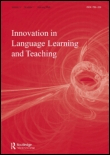
Innovation in Language Learning and Teaching
Scope & Guideline
Bridging Theory and Practice in Language Education Innovation.
Introduction
Aims and Scopes
- Innovative Pedagogical Approaches:
The journal emphasizes new and creative teaching methodologies that enhance language acquisition, including the use of technology, gamification, and collaborative learning practices. - Research on Teacher Development:
It focuses on exploring the professional growth of language teachers, their engagement with research, and the impact of teacher autonomy and emotional factors on teaching practices. - Learner-Centric Research:
The journal prioritizes studies that investigate learners' experiences, motivations, and emotional responses in language learning contexts, aiming to improve educational outcomes. - Integration of Technology in Language Learning:
There is a strong emphasis on the role of digital tools and online platforms in language education, exploring how these can facilitate learning and engagement. - Cultural and Contextual Perspectives:
The journal encourages research that considers cultural diversity and context-specific challenges in language education, promoting inclusive and equitable teaching practices. - Interdisciplinary Approaches:
It welcomes contributions that draw from various fields such as psychology, sociology, and technology, to enrich language teaching and learning methodologies.
Trending and Emerging
- Emotional and Psychological Factors in Language Learning:
Recent publications have increasingly focused on the emotional aspects of language learning, including anxiety, motivation, and enjoyment, recognizing their critical role in learner engagement and success. - Digital and Online Learning Environments:
There is a growing trend towards exploring the effectiveness of online and blended learning environments, particularly in the context of post-pandemic education, highlighting the importance of flexibility and accessibility. - Gamification and Game-Based Learning:
The integration of gamified elements into language learning has gained traction, focusing on how game mechanics can enhance motivation and engagement among learners. - Translanguaging and Multilingualism:
Emerging research emphasizes the importance of translanguaging practices and multilingual approaches in language education, advocating for more inclusive pedagogies that reflect diverse linguistic backgrounds. - Collaborative Learning and Peer Feedback:
The trend towards collaborative learning models and peer feedback mechanisms is increasing, as educators seek to foster communication skills and critical thinking through group interactions.
Declining or Waning
- Traditional Classroom Practices:
There is a noticeable decline in research focusing solely on conventional teaching methods without integrating innovative or digital approaches, reflecting a broader shift towards more dynamic educational practices. - Focus on Grammar Instruction:
Studies centered around explicit grammar instruction are becoming less frequent, as the field moves towards communicative competence and holistic language use rather than isolated grammatical accuracy. - Standardized Testing Methods:
Research discussing traditional standardized assessments is waning, as educators and researchers explore more formative and dynamic assessment strategies that reflect real-world language use. - Teacher-Centered Pedagogy:
The previous focus on teacher-led instruction is diminishing, with a growing emphasis on learner autonomy and collaborative learning approaches that empower students in their language learning journey. - Static Learning Materials:
There is a reduced focus on static, one-size-fits-all learning materials, as innovative, adaptable, and context-responsive resources are increasingly favored.
Similar Journals

ALSIC-Apprentissage des Langues et Systems d Information et de Communication
Exploring the Intersection of Language, Technology, and Communication.ALSIC-Apprentissage des Langues et Systems d Information et de Communication, published by ADALSIC, is a premier Open Access journal that has been at the forefront of language learning and information and communication systems since its inception in 1998. With its ISSN 1286-4986, this journal provides a crucial platform for researchers, educators, and practitioners to share innovative findings and pedagogical practices in the interdisciplinary fields of linguistics, education, and technology. The journal invites contributions that explore the dynamics of language acquisition, the effectiveness of communication systems, and the integration of technology in learning processes. By maintaining an Open Access policy, ALSIC ensures that its valuable research is accessible to a global audience, promoting collaboration and knowledge sharing among scholars and professionals dedicated to enhancing language education and communication methodologies. As an inclusive journal based in Strasbourg, France, it plays a vital role in shaping current discourse and advancing research in its field.

Language Learning in Higher Education
Cultivating excellence in language acquisition methodologies.Language Learning in Higher Education is a prominent academic journal published by DE GRUYTER MOUTON, dedicated to exploring the intricate dynamics of language acquisition and pedagogical practices within the higher education context. With a robust ISSN: 2191-611X and E-ISSN: 2191-6128, this journal provides a platform for innovative research that addresses contemporary challenges and methodologies in language education. The journal enjoys a favorable reputation in the academic community, as evidenced by its ranks in the Scopus database, where it holds a position in the 67th percentile for Language and Linguistics and is classified in the Q3 and Q2 quartiles across relevant education and linguistics categories. Since its convergence in 2017, Language Learning in Higher Education aims to enrich scholarly discourse by publishing high-quality articles that foster insights into effective language learning strategies, thus serving as an essential resource for researchers, educators, and students committed to enhancing language education. The journal's editorial team is devoted to advancing the field through rigorous peer-review processes and welcomes contributions that push the boundaries of language learning research.

Guiniguada
Empowering researchers with access to cutting-edge knowledge.Guiniguada is a leading open-access journal established in 2015, published by the University of Las Palmas de Gran Canaria within its Public and Scientific Diffusion Services. With its ISSN 0213-0610 and E-ISSN 2386-3374, the journal provides a platform for innovative research and critical discourse in the field of education sciences, fostering a multidisciplinary approach to educational practices and policies. Situated at the heart of Spain's vibrant academic community, Guiniguada aims to bridge the gap between theoretical frameworks and practical applications, making it an invaluable resource for researchers, educators, and students alike. As an open-access journal, it enhances the global dissemination of knowledge, ensuring that cutting-edge research is freely available to all. The journal's commitment to advancing educational research underscores its significance in shaping contemporary educational practices and influencing policy decisions.
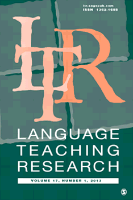
Language Teaching Research
Navigating the evolving landscape of language education.Language Teaching Research, published by SAGE Publications Ltd, serves as a pivotal platform for scholars and practitioners in the domains of education and linguistics. Since its inception in 1997, this prestigious journal has maintained its status within the Q1 category for both Education and Linguistics, symbolizing its significant impact and commitment to excellence in research. With impressive Scopus rankings placing it among the top percentile in its fields, Language Teaching Research provides a comprehensive array of articles, studies, and reviews dedicated to advancing the theory and practice of language education. Although currently not an Open Access journal, it remains essential reading for those engaged in the evolving challenges and methodologies surrounding language teaching and learning. The journal aims to foster insightful discussions and disseminate innovative research findings, making it a crucial resource for educators, researchers, and students keen on enhancing language acquisition and pedagogical strategies.
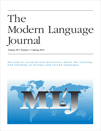
MODERN LANGUAGE JOURNAL
Exploring the Frontiers of Linguistics and Language EducationThe MODERN LANGUAGE JOURNAL, published by WILEY, stands as a premier academic resource in the field of linguistics and language studies. With its strong legacy dating back to 1916, this journal has evolved to address contemporary issues and trends in language learning, teaching, and research. It holds a prestigious Q1 ranking in both Linguistics and Language categories as of 2023, reflecting its high impact and relevance in scholarly discourse, supported by notable Scopus rankings that place it in the top percentiles of its field. The journal serves as an essential conduit for researchers, educators, and students seeking to contribute to and stay abreast of advancements in language education and linguistic theory. Although it does not currently offer open access options, the journal remains committed to disseminating significant findings that inspire innovative methodologies within the realm of modern languages.

Journal of Asia TEFL
Elevating Pedagogical Practices in a Globalized ContextWelcome to the Journal of Asia TEFL, a leading peer-reviewed platform dedicated to exploring the intersections of English language education, linguistics, and the dynamic educational landscapes of Asian contexts. Published by ASIA TEFL in South Korea, this journal has emerged as a pivotal resource for academia since its inception in 2004, with consistently expanding influence reflected in its Scopus rankings, including a notable 76th percentile in Linguistics and Language. With a focus on the evolving methodologies and pedagogical innovations in English language teaching, the journal aims to foster scholarly discussions that enhance teaching practices and policy-making in a globalized world. Although it currently operates without open access, its rigor and relevance in categories such as Education and Linguistics ensure that it remains a valuable asset for researchers, educators, and students seeking to advance their knowledge and practice within this vital field of study.
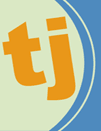
TESOL Journal
Advancing the Art of Language EducationTESOL Journal, published by Wiley, is a premier academic journal dedicated to advancing the field of Teaching English to Speakers of Other Languages (TESOL). With an esteemed reputation reflected in its high impact factor and its Q1 ranking in both Education and Linguistics and Language categories for 2023, this journal serves as a critical resource for researchers, educators, and policy-makers. It covers a wide spectrum of topics related to language acquisition, pedagogical innovations, and educational strategies in TESOL, contributing significantly to the discourse around multilingualism and effective teaching practices. The journal is notable not only for its rigorous peer-review process but also for its commitment to disseminating high-quality research that informs and inspires practice in diverse educational settings. Interested readers can access articles through traditional subscription methods, ensuring that groundbreaking research is available to a broad audience. With converged years spanning from 2010 to 2024, TESOL Journal continues to evolve, making it a vital publication for anyone interested in the complexities of language education.

Latin American Journal of Content & Language Integrated-LACLIL
Bridging Content and Language for Educational ExcellenceThe Latin American Journal of Content & Language Integrated-LACLIL, published by UNIV SABANA, FAC ENFERMARIA, is a pioneering open-access journal that has been serving the academic community since 2008. With an aim to foster the integration of content and language learning, LACLIL is a crucial resource for researchers, educators, and students interested in the intersection of linguistics, education, and bilingualism within the Latin American context. By promoting high-quality scholarly articles, this journal not only enhances understanding and practice in Content and Language Integrated Learning (CLIL) but also contributes to the discourse surrounding effective teaching methodologies. LACLIL encourages contributions that deepen insights into pedagogical strategies and curricular development, making it an essential platform for professionals dedicated to advancing language education in diverse cultural settings.
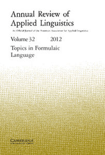
Annual Review of Applied Linguistics
Exploring critical issues and emerging trends in language studies.The Annual Review of Applied Linguistics, published by Cambridge University Press, stands as a premier journal in the realm of linguistics and psychology, with an impressive impact factor identifying its significance: ranking in the Q1 quartile across both fields in 2023. With an ISSN of 0267-1905 and an E-ISSN of 1471-6356, this journal endeavors to provide comprehensive and insightful reviews covering an array of topics within applied linguistics, thus supporting researchers, professionals, and students in advancing their understanding and expertise. Operating from its base in Cambridge, United Kingdom, the journal has maintained a consistent commitment to scholarly excellence since its inception, accelerating discussions on critical issues and emerging research trends from 2005 to 2024. Notably, it holds a prestigious position in Scopus, ranked #26 in Language and Linguistics and #30 in Social Sciences, showcasing its influence and contribution to the scholarship in the field. The Annual Review of Applied Linguistics thus stands as an essential resource for anyone engaged in linguistic research and application.
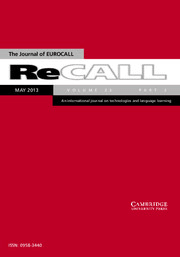
ReCALL
Exploring the Future of Language Learning through TechnologyReCALL is a prestigious academic journal published by Cambridge University Press, focusing on the rapidly evolving interplay between technology and language learning. Established in 1989, this quarterly journal holds a distinguished Q1 ranking across multiple categories including Computer Science Applications, Education, and Linguistics and Language, reflecting its commitment to the highest standards of scholarly excellence. With an impressive Scopus ranking that places it in the top percentiles across its fields, ReCALL serves as a vital resource for researchers, educators, and professionals interested in the integration of technology in language education. It features cutting-edge research articles, innovative methodological approaches, and comprehensive reviews that offer insights into the current trends and future directions of language learning, teaching, and assessment. By providing a platform for penetrating inquiry and dialogue, ReCALL significantly enhances the discourse surrounding computer-assisted language learning (CALL) and its influence on educational practices worldwide.